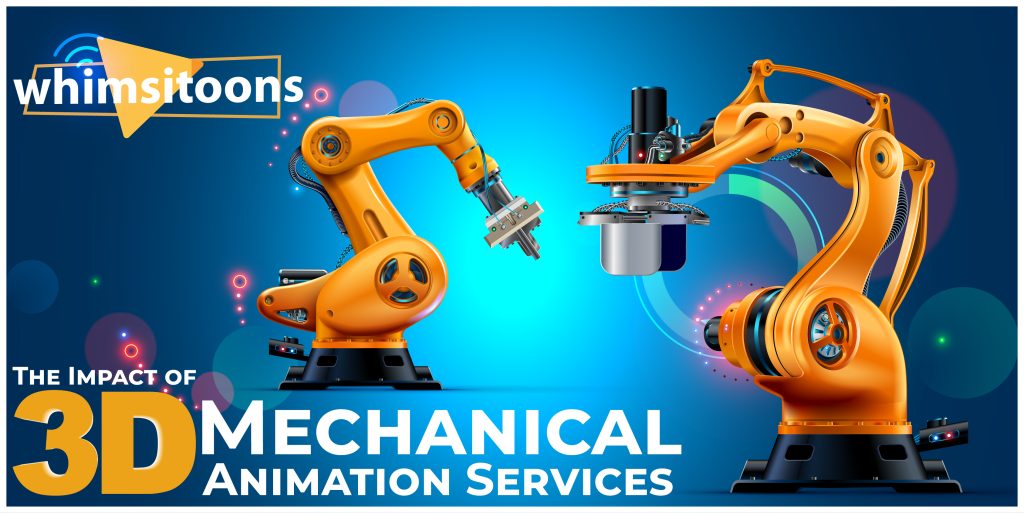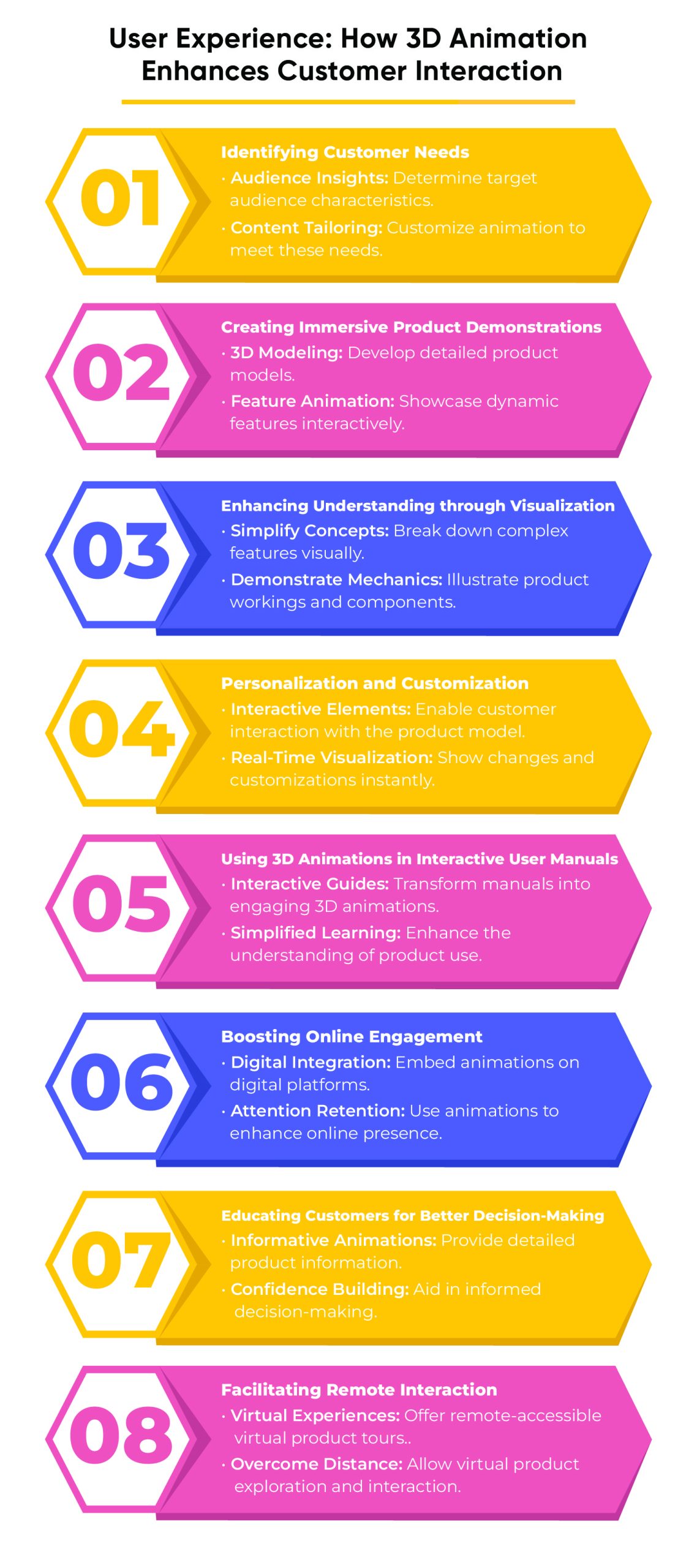The Impact of 3D Mechanical Animation Services

3D mechanical animation services have emerged as a game-changer.
By bringing static concepts to life, these services enable professionals to visualize, analyze, and present mechanical designs in dynamic, highly engaging ways.
You are going to figure out how these services are transforming industries, from automotive to aerospace, and why they’re essential in today’s fast-paced, technology-driven market in this Whimsitoons blog.
What Is 3D Mechanical Animation
3D mechanical animation involves creating three-dimensional moving visuals to represent mechanical processes, systems, and products.
This technology leverages computer-aided design (CAD) data to produce animations that accurately depict the functionality and mechanics of a design.
Why 3D Mechanical Animation Is A Game-Changer
-
Enhanced Visualization:
3D machine animation services transform complex mechanical concepts into easy-to-understand visuals.
-
Improved Communication:
These 3D animations help designers, engineers, and non-technical stakeholders to have a common understanding about the topic and discuss it clearly.
-
Efficient Design Process:
The designing process allows for quick identification and rectification of design flaws.
-
Marketing and Sales Tool:
Acts as a powerful tool in showing product capabilities to potential customers.
The Range of Uses for 3D Animation in Mechanical Design
3D mechanical animation services are not limited to a single industry. It is a useful asset in many different fields due to its adaptability.
Automotive Industry
- Design and Testing: Visualize the mechanics of vehicle components, demonstrating the benefits of 3d animation in automotive engineering and design processes.
- Customer Engagement: Use animations for marketing new models and features.
Aerospace and Aviation
- Aircraft Design: Showcase the functionality of aircraft systems.
- Maintenance Training: Create detailed training modules for technical staff.
Manufacturing and Machinery
- Process Visualization: Depict machinery processes and workflow.
- Product Development: Test and improve product designs virtually.
Robotics and Automation
- Robot Design: Demonstrate the functionality of robotic systems.
- Automated Systems: Visualize complex automated processes.
How 3D Mechanical Animations are Made
Creating a 3D mechanical animation involves several steps, each critical to the final output.
- Conceptualization: Understanding the mechanical process or product to be animated.
- Modeling: Using CAD data to create 3D models of the components.
- Texturing and Lighting: Adding textures and lighting to make the animation realistic.
- Rigging and Animation: Rigging the models for movement and creating the animation.
- Rendering and Post-Production: Final rendering and adding effects or voiceovers.
Comparing 2D and 3D Mechanical Animations
| Aspect | 2D Animation | 3D Mechanical Animation |
| Visualization | Limited depth and perspective | Realistic, multi-dimensional |
| Detail | General representation | Highly detailed and precise |
| Interactivity | Static | Dynamic and interactive |
| Appeal | Standard | Highly engaging and attractive |
| Application Scope | Basic concepts | Complex mechanical processes |
Where is 3D Mechanical Animation Heading?
| Trend | Description |
| AI and Machine Learning Integration | Automating tasks like rigging and lip-syncing to enhance efficiency and creative focus. |
| Real-Time Rendering Advancements | Reducing production times with instant feedback, beneficial for VR and AR applications. |
| Virtual and Augmented Reality | Offering alluring experiences for interaction in education, training, and entertainment. |
| Cloud-Based Animation Platforms | Facilitating remote collaboration and access to high processing power without expensive hardware. |
| Sustainability in Animation | Focusing on energy-efficient processes and sustainable practices to reduce environmental impact. |
| Interactive and Customizable Animations | Allowing for user-driven narratives and experiences, making animations more engaging and personalized. |
Overcoming Challenges in 3D Mechanical Animation
While 3D mechanical animation offers immense benefits, it’s not without its challenges.
-
Technical Expertise
Creating high-quality 3D animations requires a combination of technical skills and mechanical knowledge.
-
Time and Resources
High-quality animations can be resource-intensive, requiring significant time and effort.
Benefits Of 3d Animation In Aerospace
Customer interaction has gone beyond traditional boundaries, thanks largely to technologies like 3D mechanical animation.
This innovative tool is not just about showcasing a product; it’s about creating an enchanting, interactive experience that resonates with customers.
Let’s see how 3D animation is benefiting customer interaction in various industries.

Creating Appealing Product Demonstrations
3D animation enables businesses to provide customers with a dazzling view of their products.
Unlike static images or traditional 2D diagrams, 3D animations offer a dynamic presentation where customers can virtually explore a product from every angle.
For instance, in the automotive industry, dealers can use 3D animations to showcase the inner workings of a car’s engine in real-time, allowing customers to understand complex features without needing a physical model.
Enhancing Understanding through Visualization
Complex products, especially in industries like aerospace, robotics, or machinery, can be challenging to explain through words or simple diagrams.
3D animation bridges this gap by visually demonstrating how these products function.
This not only enhances the customer’s understanding but also builds trust, as customers are more confident about what they are investing in.
Customization and Personalization
One of the most exciting aspects of 3D animation is the ability to personalize the customer experience.
For example, in the real estate sector, potential homebuyers can take virtual tours where they can customize interiors using 3D models.
This level of personalization allows customers to make informed decisions and lead to a deeper connection with the product.
Interactive User Manuals and Guides
Gone are the days of bulky, confusing user manuals. 3D mechanical animations are now being used to create interactive guides that are both user-friendly and informative.
Customers can interact with these animated manuals, which makes understanding and using complex products much easier and more enjoyable.
Boosting Online Engagement
When it comes to online shopping, engaging customers online is crucial. 3D animations are an effective tool for capturing attention on websites and social media platforms.
They provide an engaging way to highlight product features, benefits, and uses, leading to increased customer engagement and, ultimately, conversions.
Educating Customers for Better Decision-Making
Educated customers make better purchasing decisions. 3D animations can serve as educational tools that explain the value and functionality of a product.
This is particularly beneficial for high-tech products, where understanding the technical aspects can significantly influence a customer’s purchase decision.
Facilitating Remote Interaction
As remote interaction has become increasingly common, 3D animations allow customers to experience products virtually, eliminating the need for physical presence.
This is especially useful in current scenarios where face-to-face interactions might be limited.
Conclusion
3D mechanical animation services are not just a tool; they’re a new approach to design, presentation, and communication in the mechanical industry.
By including these services, industries can propel themselves into a future where ideas are not just seen but experienced.
The potential is limitless, and the time to leverage this technology is now.
FAQs
Q 1: What makes 3D mechanical animation different from traditional 2D animation?
3D animation provides a realistic, multi-dimensional view, making it more suitable for depicting complex mechanical processes.
Q 2: Can 3D animation be used for training purposes?
Absolutely! It's an excellent tool for creating detailed training modules, especially in technical fields.
Q 3: How long does it take to create a 3D mechanical animation?
The time frame varies based on complexity, but it generally takes several weeks to a few months.
Q 4: Is 3D animation expensive?
The cost depends on the project's scope and detail level. While it can be costly, the ROI in terms of improved understanding and communication is significant.
Q 5: Can existing CAD data be used for creating animations?
Yes, CAD data forms the basis for most 3D mechanical animations, making the process more efficient.










